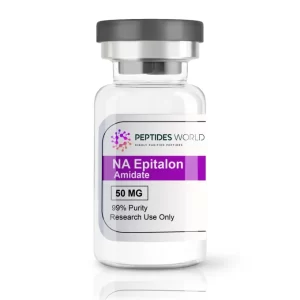DISCLAIMER: The information contained in this document is intended solely for educational and laboratory research purposes. Epitalon (Epithalon) is a research chemical not approved by the FDA or any medical regulatory authority for use in humans or animals. This compound is not intended to diagnose, treat, cure, or prevent any disease or medical condition. The statements contained herein have not been evaluated by any health or drug authority. Any reference to biological activity or medical research is strictly for scientific understanding and does not constitute promotional or medical advice. This product is not intended for personal use, and all handling must be done by qualified professionals in controlled research environments. The supplier and publisher of this document assume no liability for misuse, abuse, or unauthorized application of the information or material provided.
NOTICE: By purchasing this product, the buyer acknowledges that the product is supplied in lyophilized (freeze-dried) form and is intended strictly for laboratory research purposes. It is not formulated or approved for direct human or veterinary use.
Epitalon (Epithalon) 20mg – Advanced Research Peptide
Epitalon, also known as Epithalon or AEDG peptide, is a synthetic tetrapeptide made up of the amino acids Alanine (Ala) – Glutamic Acid (Glu) – Aspartic Acid (Asp) – Glycine (Gly). Developed by Professor Vladimir Khavinson at the St. Petersburg Institute of Bioregulation and Gerontology, Epitalon is modeled after the naturally occurring peptide Epithalamin, secreted by the pineal gland. It has garnered significant attention in gerontological and cellular aging research for its telomerase-activating, antioxidant, and regenerative properties.
Molecular Characteristics
Peptide Sequence: Ala-Glu-Asp-Gly (AEDG)
Molecular Formula: C₁₄H₂₂N₄O₉
Molecular Weight: 390.349 g/mol
PubChem CID: 219042
CAS Number: 307297-39-8
Mechanisms of Action and Pathways Studied
1. Telomerase Activation and Telomere Length Preservation
Epitalon activates telomerase, the enzyme responsible for the maintenance and repair of telomeres—the protective caps at the end of chromosomes. In a 2003 study, Khavinson et al. demonstrated that Epitalon increased telomerase expression in human somatic cell cultures, leading to telomere elongation. In animal studies, Epitalon was associated with extended maximum lifespan and reduced age-related chromosomal aberrations.
A 2024 study published in Frontiers in Cell and Developmental Biology found that Epitalon protected mitochondrial membrane potential and reduced ROS accumulation in bovine cumulus-oocyte complexes.
2. Epigenetic Modulation and Neuroprotection
Epitalon modulates gene expression, especially genes involved in neuronal development. It has been shown to induce neuronal differentiation in cultured human stem cells and regulate circadian rhythms by normalizing melatonin production.
3. Antioxidant Defense and Free Radical Scavenging
Epitalon acts as a potent antioxidant, reducing free radical generation and increasing the activity of endogenous antioxidant enzymes such as superoxide dismutase and glutathione peroxidase. It may outperform melatonin as a direct ROS scavenger.
4. Immunomodulation and Thymic Restoration
Epitalon stimulates thymic lymphocyte proliferation in aging models and increases interleukin-2 production, enhancing T-cell function and immune resilience.
Additional Research Findings
- Cancer Research: Shown to reduce spontaneous tumor formation in aged animals.
• Endocrine Health: Normalizes hormonal secretion in aged rats.
• Circadian Function: Restores youthful melatonin rhythms and sleep regulation.
Potential Research Applications
- Cellular aging models
• DNA damage repair studies
• Neurodegenerative disease pathways
• Reproductive aging
• Oxidative stress modeling
• Immunosenescence and vaccine response models
Formulation, Handling & Storage
- Form: Lyophilized powder
• Recommended Reconstitution: Sterile water or bacteriostatic saline
• Storage: -20°C (lyophilized), 4°C (reconstituted)
• Stability: 24 months when frozen and unopened
Important Legal Disclaimer
This product is sold strictly for in vitro laboratory research use only. It is not intended for human ingestion, medical, diagnostic, or veterinary use. By purchasing, you agree to use it in compliance with all applicable research regulations.
Anti-Aging and Longevity Potential
Epitalon has been extensively studied for its role in extending lifespan and reversing age-related biological markers. Its primary mechanism—activation of telomerase—directly addresses cellular senescence, a key hallmark of aging. Telomere shortening leads to cell cycle arrest and apoptosis, which underlie tissue degeneration, immune decline, and organ dysfunction.
By promoting telomere elongation, Epitalon supports continued cellular replication and genomic integrity. In animal studies, long-term administration of Epitalon has been associated with a significant increase in maximum lifespan, a reduction in chronic age-related conditions, and improved physical and cognitive function in older subjects.
In addition, Epitalon modulates pineal gland function, increasing the production of melatonin and normalizing circadian rhythms. This hormone regulation is essential for metabolic health, sleep quality, immune resilience, and neuroprotection—making it a cornerstone in anti-aging interventions.

